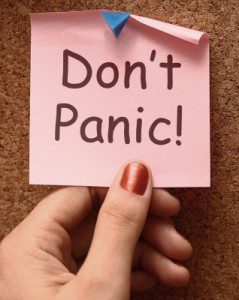 Josh looked at his audience and began to panic. What if he humiliated himself? What if he forgot his speech? What if he bombed with his audience? His heart began to race, his hands became sweaty. Josh felt like he was about to faint and couldn’t think. His mind went blank. Josh was having a panic attack.
Josh looked at his audience and began to panic. What if he humiliated himself? What if he forgot his speech? What if he bombed with his audience? His heart began to race, his hands became sweaty. Josh felt like he was about to faint and couldn’t think. His mind went blank. Josh was having a panic attack.
Panic can be frightening because of the intense physical and psychological symptoms associated with it. During a panic attack, you may feel as if you will die or lose total control. However, panic will not lead to a heart attack, suffocation, fainting, falling or you going crazy. You may feel as if these things are about to happen because of the physical sensations you experience. But the reality is these sensations will pass, and your health will not be endangered. Panic is very unpleasant, but not dangerous.
Here are a few practical tips to help overcome panic:
1) Know what triggers panic. There may be a pattern or specific thing that brings on panic. For Josh, it was speaking in public. Try to record what happens prior to the attack and see if you can idenitify a common trigger. For example, panic may come every time you see your stepfather, feel enclosed, have to make a public speech, or take an important test.
2) Eliminate stimulants from your diet (caffeine, nicotine, medications). These can aggravate and trigger anxiety.
3) Don’t try to resist or avoid the panic symptoms. Instead recognize the symptoms and tell yourself you can handle them. They will pass. Avoiding just reinforces the fear and doesn’t help you master the symptoms. Working with panic means riding into the storm, not avoiding it.
4) Repeat a “Yes I can” statement over and over. For example, “God has not given me a spirit of fear. I can ride this out and be OK. Nothing terrible is going to happen to me. This will soon pass. I can take the hit.”
5) Go through the panic. Don’t try to escape, instead endure it and you will eventually see that nothing terrible happens.
The key to overcoming panic is exposing yourself to it and coming out on the other side. Take away your safely measures and be fully exposed. This is what releases most people from panic. For example, if you panic going into an elevator, don’t keep taking the stairs (that is avoidance). Find a therapist who will help you face the fear and get on that elevator no matter how afraid you are. Then hit the button and down you go. It will feel terrible, but at the end, you realize you did it, you didn’t die or faint. This mastery will build your confidence to do it again and again until the panic is gone.


